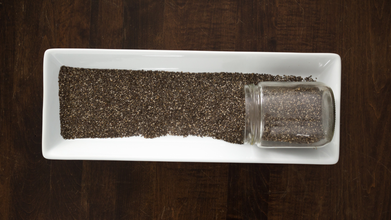- Health Conditions A-Z
- Health & Wellness
- Nutrition
- Fitness
- Health News
- Ayurveda
- Videos
- Medicine A-Z
- Parenting
Can Drinking Tea Count In Your Daily Water Intake?

Image Credit: Canva
When it comes to staying hydrated, many people rely on the classic advice of drinking plenty of water throughout the day. However, there’s a common belief that drinking tea doesn’t contribute to hydration in the same way as water does, and in some cases, it may even work against it. But does science actually support this claim? Does your daily cup of tea count toward your water intake, or is it a cause for concern?
Before we dive into how tea affects hydration, it's important to understand how much fluid the body actually needs. According to the National Academy of Medicine, the average adult should consume about 9 to 13 cups (roughly 2.7 to 3.7 liters) of water per day, depending on factors such as gender, physical activity, and climate. This water intake isn’t restricted to just plain water—other beverages like tea, coffee, and juice, as well as water-rich foods like fruits and vegetables, can contribute to overall hydration. Fluid will make the body perform its primary functions. Fluid is required by the body to keep running all of its basic operations, such as lubricating joints, aiding digestion, and protecting tissues. You will experience fatigue, headaches, and dry skin in a short while, but if you meet your fluid needs, you are sure to feel energized and help your body support the most important processes of your body.
Does Tea Count in Your Daily Fluid Intake?
It also raises a question about whether tea counts as water. Caffeine in tea, which is a mild diuretic, makes one worry that it might defeat the hydrating effect. The thinking is that if caffeine increases urine output, that's basically increasing dehydration. However, it's not that simple. Although research does show that the diuretic effect that caffeine may bring is minimal in magnitude and, more especially, negligible when consumed moderately.
Research conducted in the year 2011 with the published findings in the British Journal of Nutrition came out to say that the differences in hydration are insignificant for both black tea and water. Another study, published in 2014 in the PLOS One journal, revealed that caffeine is only diuretic at around 500 milligrams per day—an amount much higher than one would consume in an ordinary 8-ounce cup of tea, which contains about 30 to 50 milligrams of caffeine, depending on type. So, in effect, for most of its consumers, drinking tea doesn't have a large enough impact on hydration. In fact, herbal teas contain no caffeine whatsoever, which means they offer the same hydration benefits as plain water.
So, if you like sipping on a warm cup of chamomile, peppermint, or other herbal teas, rest assured that these beverages are contributing to your daily fluid intake.
Tea vs. Water: Which is Better for Staying Hydrated?
While water is the most commonly known hydrator, it is not your only choice. The Mayo Clinic says that about 20% of your total daily fluid intake comes from food, and the remaining fluids come from drinks. Both hot and cold teas, black, green, or herbal, help contribute to hydration.
Though caffeinated, black and green teas contain a considerable quantity of water per serving. For most people, a glass of water is equal to a cup of tea: the diuretic effects of the caffeine are but a minor factor when it is drowned out by the water content of the tea itself.
However, you also must take into account other additives in your drink. While a cup of coffee is significantly higher in caffeine - estimated to be around 80 to 100 milligrams per 8 ounces – if you limit the consumption to four cups or less, it's well within your daily quota to count toward your liquid consumptions.
Effects of Added Sugars in Tea on Your Body
Though tea is a good hydrant, the preparation of it makes a difference in its overall healthiness. Many individuals add sugar, milk, or other ingredients to tea, which would otherwise ruin its health benefits.
One of the main problems of tea is the sugar it contains. The American Heart Association has reported that excess consumption of sugar has been directly linked to obesity, diabetes, and heart disease among other health problems. With sweetened tea, mainly from bottled or pre-made ones, a great amount of refined sugars might be found in them and thus counteracts the probable health benefits that can be derived from tea.
Drinking unsweetened tea, however allows one to enjoy all the benefits of hydration without the additional calories or health risks attached to sugar.
What's Best Drink for Hydration?
Interestingly, there may be a drink that beats water and tea in terms of hydration efficiency: skim milk. A study that was published in the American Journal of Clinical Nutrition revealed that beverages containing a small amount of sugar, fat, or protein, such as milk, are effective for hydration even better than water and even tea. This is because these nutrients delay the drainage of fluid from the stomach, maintaining hydration levels for a longer period of time.
Other Health Benefits for Drinking Tea
Apart from hydration, a significant amount of health benefits accompanies tea drinking. Both black and green teas contain numerous antioxidants to fight off the inflammatory issues and oxidative stresses in one's body. It improves heart health with decreased cholesterol levels, blood pressure, and increases the level of memory. Drinking more tea can bring weight loss and an increase in living years.
Herbal teas, though caffeine-free, have a number of health benefits. For example, the chamomile tea has a soothing effect, thus reducing stress and promoting better sleep, while peppermint tea may help in digestion.
Drinking tea can absolutely count toward your daily hydration needs. While the caffeine in black and green teas may have a mild diuretic effect, it’s unlikely to significantly impact hydration unless consumed in excessive amounts. Herbal teas, which contain no caffeine, are just as hydrating as water. Moreover, tea offers numerous health benefits that go beyond hydration, making it a smart choice for anyone looking to boost their wellness routine.
So, the next time you grab your favorite cup of tea, rest assured you're not only hydrating but also drinking something full of other health benefits. Whether it's a warm cup of green tea or soothing herbal blend, tea can be a great addition to your fluid intake for the day. Just keep in mind how you make it: look for unsweetened versions to cut down on sugar intake and reap its greatest health rewards.
Scientists Reveal The Reasons Why Tofu is Better Than Paneer

(Photos: Canva)
In modern days, people are choosing vegan alternatives for sources of protein rather than dairy products.
Paneer and tofu are both foods sold in white blocks that can be added to dishes spanning many Asian cuisines. The production of both foods involves curdling and pressing. Each has a mild taste on its own yet absorbs the flavours of its marinades.
Paneer is made by curdling hot milk with an acidic substance like lemon juice, vinegar, or curd, whereas tofu is made from soy and does not contain animal-based ingredients.
However, scientists say tofu is a superior, lower-calorie, and cholesterol-free alternative to paneer for weight management, offering 75 percent less fat and higher iron.
Here is why:
Heart Health
Tofu provides healthy plant fats, which are better for the heart, including omega-3 fatty acids, which help improve overall cholesterol balance and reduce inflammation in blood vessels.Coronary artery disease, which is caused by plaque build-up up and inflammation in the blood vessels, is one of the leading causes of heart attacks and strokes in the country. However, eating tofu can reduce chances of developing coronary artery disease.
Unlike other dairy sources of protein, tofu is low in saturated fat and significantly lowers the risk of bad cholesterol, which is a leading factor for heart problems.
Prevents Chronic Diseases
Soy protein and compounds in tofu may help the body use insulin more effectively, reducing the risk of Type-2 diabetes.It contains antioxidants that prevent cells from damage that can lead to cancer. Research suggests that regular intake may reduce chances of breast, prostate and colon cancer.
Maintains Bone Health
Both protein and tofu are rich sources of calcium, but tofu comparatively contains more calcium.Isoflavones in tofu may reduce bone breakdown, particularly in postmenopausal women who are more prone to osteoporosis.
Rich In Nutrients A detailed nutrient comparison reveals that 100 grams of tofu has only about 70–80 calories and around eight grams of protein. Paneer, in comparison, has roughly 265–300 calories and 12–15 grams of saturated fat per 100 grams.
Vegan Alternative Tofu is a lighter, plant-based alternative suitable for those seeking better heart health, weight control, or a vegan diet.
Being dairy-free, it is suitable for vegans, lactose-intolerant individuals, and those who avoid animal-based foods for ethical, health, or religious reasons.
Diverse Dishes
It is a versatile source of protein that can be added to various Asian cuisine dishes. Tossed with veggies and salt and pepper or added in Pad Thai noodles.Morning Vs Evening Workouts: Which Is More Productive

(Photos: Canva)
While morning sun beams are said to be a productive and a consistent start to the day, evening workouts are known for reducing stress after a monotonous routine.
But while experts have dividing views on which time is better for a session, research shows that both have their own benefits.
Here’s why getting a quick workout done before work is good for you:
1. Improve Cognitive Function And Productivity
Starting the day with a good exercise routine can give you consistent energy and focus at work, giving you a much-needed boost for the hectic day.Morning exercises also stimulates the release of neurotransmitters like dopamine (feel-good) and norepinephrine (fight-to flight), increasing blood flow which keeps you attentive throughout the day.
2.) Reduced Muscle And Joint Stiffness
After a good sleep you need to release all that build up stiffness in your body, Movement in the morning increases circulation improving joint mobility. Exercising in the morning allows the body to adapt to activity, warm up stretches and light cardio increases blood flow, lubricates the joints and reduces stress on knees and hips.Seated knee extensions, hamstring stretches and mini squats ease inflammation in knees and joints, which further improves mobility.
3.) Boost Metabolism and Positive food choices
A 2018 study published in the International Journal of Obesity noted that 2,680 college students who completed a 15-week exercise program were more likely to choose healthier options rather than fried food.By utilising store fat as fuel, exercising in the early hours stabilizes blood sugar and reduces cravings for unhealthy food. Workouts also allow muscles to absorb glucose from the blood preventing spikes after breakfast and during the day, preventing the development of Type-2 diabetes in the future.
4.) Positive Psychological Impact
Exercising early distracts you from anxious thoughts, it also helps release happy and stress relieving hormones like endorphins, dopamine and serotonin, that ultimately reduces stress, anxiety and symptoms of depression.You will feel a sense of accomplishment and achievement before starting the day which can boost overall brain health.
However, evening workouts also have many advantages including:
1.) Enhanced Physical Performance
Body temperature peaks in the late afternoon due to natural immune response which can lead to inflammatory cytokines.This leverages the body's natural circadian rhythm in the evening which increases flexibility, strength and potentially allows for more vigorous workouts.
Research shows that individuals may take up to 20 percent longer to reach exhaustion, allowing time for heavy weightlifting and intense cardio effective for weight loss.
2.) Promotes Better Sleep
After a long day, evening workouts are perfect for helping you escape the frustration of a tiring day.Exercising in the evening, improves blood vessel elasticity and reduce vascular resistance that overall helps to regulate cardiovascular health.
Consistent evening exercise stabilises heart health, experts observe that workouts can keep blood pressure lower for up to 24 hours.
3.) Increased Calorie Burn
The body is physically and mentally prepared for an active workout session, which allows heavier lifting and more intense cardio workouts leading to faster fat loss and more calories to burn.In the evening, the body is better able to absorb and transport oxygen to active muscles leading to improved energy during exercise.
4.) Appetite Regulation
Cravings at night usually arrive from hormonal shifts or due to the body's circadian rhythm. Physical activity redirects blood flow away from the stomach toward muscles to improve insulin sensitivity and manages late night cravings.High-intensity evening exercises can reduce levels of ghrelin, the hormone that triggers hunger, which manages calories and regulates appetite.
AI-generated Videos of Chia Seeds Have Got Doctors Concerned About Its Use

Credits: iStock
AI-generated videos with deep, dramatic voiceovers are flooding TikTok and Instagram, promising that a spoonful of chia seeds in water can fix digestion, melt fat and transform gut health almost overnight. The clips look slick, confident and science-backed. But experts say this latest wellness trend needs a reality check.
The chia seed challenge and the social media hype
The so-called chia seed challenge has exploded online, with millions of views across platforms. Health and wellbeing influencers, along with AI creators, are pushing the tiny seeds as a cure-all for weight loss and bloating. While chia seeds are not new to nutrition science, dieticians and media experts warn that social media often stretches the truth.
With so much content out there, it has become harder to tell what is genuine health advice and what is exaggerated clickbait.
What exactly are chia seeds?
Chia seeds come from the flowering plant Salvia hispanica, which resembles lavender. Native to Mexico, chia was a staple in the Aztec diet and has since been introduced to parts of Australia, including the Northern Territory, Queensland and Western Australia’s Ord Valley in the Kimberley.
They are commonly added to smoothies, overnight oats, puddings and even homemade jams. Found in supermarket health aisles, chia seeds can be black or white, with no nutritional difference between the two.
Are chia seeds actually good for you?
Amelia Harray, a dietician at the University of Western Australia, told ABC News, chia seeds deserve their reputation as a nutritious food, just not the miracle status social media gives them.
“Like lots of nuts and seeds, chia seeds are absolutely superfoods,” Dr Harray said. “They are about 24 per cent protein and they are a complete protein source, meaning they contain all nine essential amino acids.”
Chia seeds are also high in fibre, around 33 per cent, including both soluble and insoluble fiber. According to Dr Harray, fibre supports gut health, helps lower cholesterol and keeps you feeling full for longer.
However, she warned against suddenly consuming large amounts. “If someone has a very low-fiber diet and then starts eating lots of chia seeds, they might experience bloating or abdominal cramps,” she said.
Read: Superfood Chia Seeds Can Also Be Risky For Some, Know Who They Are
Do you need to soak chia seeds first?
One popular claim online is that chia seeds must be soaked to “activate” their benefits. Dr Harray says that is not true.
“We know you do not need to soak chia seeds to get the nutritional benefits,” she said. “That idea is not supported by evidence.”
Chia seeds can be eaten soaked or unsoaked, sprinkled over yoghurt or cereal. When soaked, they form a gel, which some people find easier on digestion. Dr Harray does caution against eating dry chia seeds by the spoonful, as they can swell and become a choking risk.
Why you should question viral health videos
Tama Leaver, a professor of internet studies at Curtin University, says the chia trend is part of what he calls the “wellness loop.”
“Some creators stick close to health advice, but others push it as a miracle cure,” Professor Leaver said. “That exaggeration is how they get clicks and make money.”
He added that AI-generated videos make it even harder to trust what you see. “We cannot take anything at face value,” he said, urging users to check who is behind the content and whether claims are backed by real evidence.
In short, chia seeds can be a healthy addition to your diet. Just do not believe every booming AI voice that promises they will change your life overnight.
© 2024 Bennett, Coleman & Company Limited

